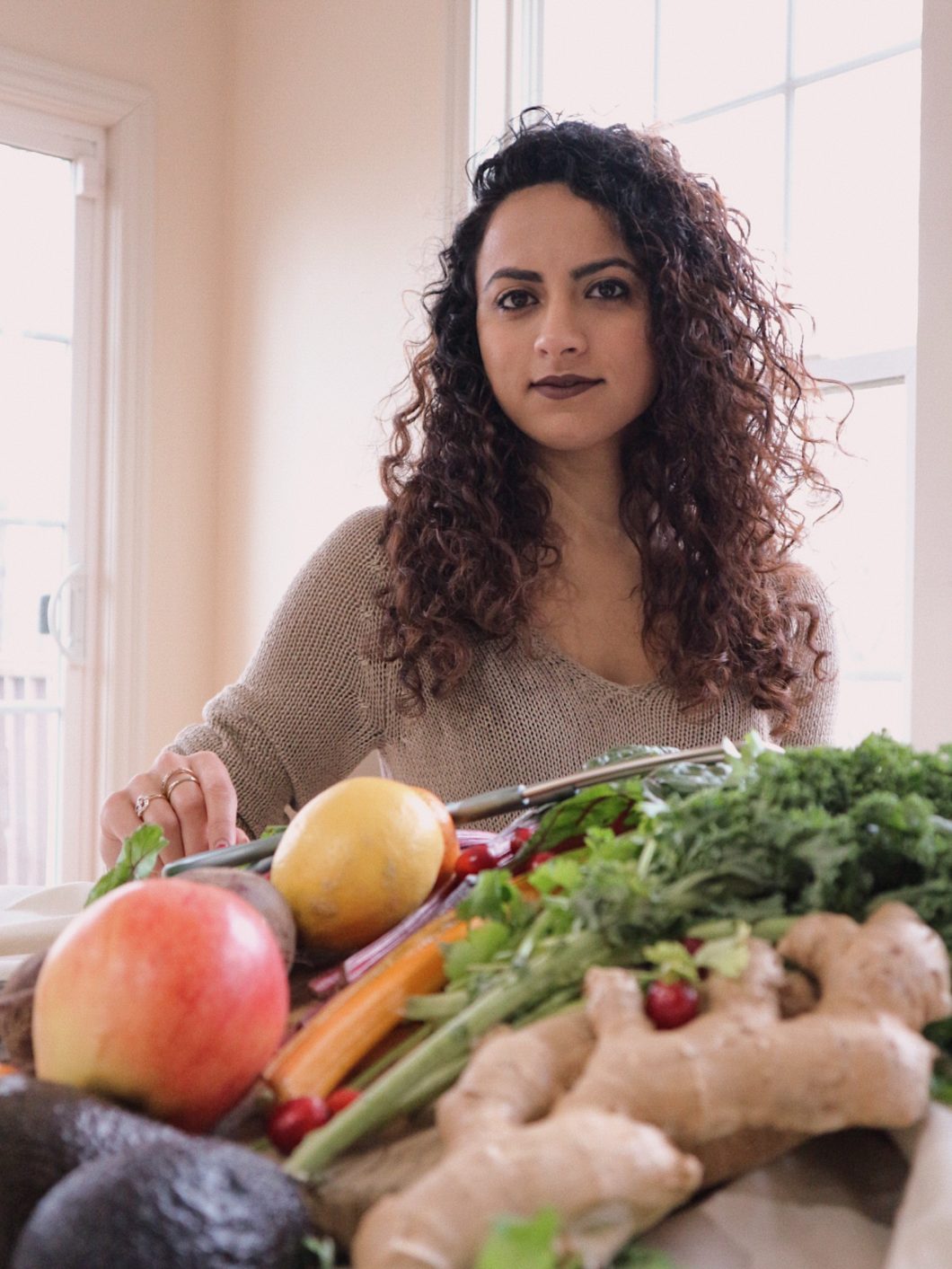There is so much information circulating about natural medicine these days. Between organic foods, superfoods, supplements, CBD and endless warnings of what’s good and bad for us, it can be hard to sort the top from the bottom. Amidst all of the confusion, it can be tempting to just throw up our hands and say to hell with it all, but at the end of the day, our health is still our most precious resource and knowing how to care for ourselves and distinguish the bs marketing from the truth is invaluable.
That’s why I’m excited to share an interview I did with a good friend of mine, Dr. Hanisha Patel, ND. Hanisha is a certified naturopathic medical doctor, which is a practice that blends traditional medicine with modern, “Western” practices. Much like her career of choice, Hanisha herself is also an incredibly well-rounded individual whom I can always trust to keep things grounded while also looking at the bigger picture. I’m extremely grateful to count her as a friend, and I can’t wait to share some of her knowledge with you.
We talk about what naturopathic medicine actually is and some of the greatest misconceptions that surround it, how her training has informed her world view, some of the most impactful things you can do if you want to take control of your health, and more.
Let me know in the comments if any aspects of our conversation were enlightening or clarifying for you!
~
1. To start, can you define naturopathic medicine and tell me about what drew you to this career path?
Naturopathic medicine is a distinct primary health care profession that combines the ancient wisdom of nature with the rigors of modern science. Naturopathic doctors are trained as primary care providers who diagnose, treat, and manage patients with acute and chronic conditions. They concentrate on whole-person wellness attempting to find the underlying cause of the patient’s condition to optimize their health and prevent disease.
Every Naturopathic Doctor has a unique story of what brought them to naturopathic medicine. My story starts with my undergraduate career at The Ohio State University where I received my bachelor’s in pharmaceutical sciences. While I was learning pharmacology, I was confused. For every medication, there were multiple side effects, then there was a medication for those side effects and the cycle continued until each person was on a myriad of medications. Our professor also helped us understand the monetary gains the pharmaceutical industry received from speeding up the research on medications. This led me to wonder if this was the only way of practicing medicine.
Being Indian American, I grew up with Ayurvedic medicine (ancient Indian medicine). I knew a lot of the remedies were helpful when I wasn’t feeling great but my parents never knew why they were helpful. I decided to explore this type of medicine further and traveled to India and Guatemala where I learned of the traditional medicines of these two nations. When I came back to the states I decided I wanted to practice more holistically where I could use herbs and nutrition to help people get to the root of their illnesses. I spoke to an optometrist from Seattle about my passion and she told me about naturopathic medicine. I read the principles and the therapeutic order and immediately knew it was the path for me.
2. How did your training as an ND inform or change your view of the world? I imagine that working with and studying the amazing healing powers of the body may have shifted your perspective on many aspects of life.
 My training at Bastyr University California has morphed me into an open-minded skeptic. This three-word phrase is the philosophy I live by now. This means I stay open to any ideas or views. This could be some type of healing method I have never heard of or a political view I don’t understand because of my upbringing. Whatever it is, I stay open to the possibility that this view/idea could be effective or right. However, I continue to question everything. How could that healing method be effective? Does the right to bear arms mean there should be little/no regulation over who can obtain these arms? By regulating these arms, are we being stripped of certain freedoms?
My training at Bastyr University California has morphed me into an open-minded skeptic. This three-word phrase is the philosophy I live by now. This means I stay open to any ideas or views. This could be some type of healing method I have never heard of or a political view I don’t understand because of my upbringing. Whatever it is, I stay open to the possibility that this view/idea could be effective or right. However, I continue to question everything. How could that healing method be effective? Does the right to bear arms mean there should be little/no regulation over who can obtain these arms? By regulating these arms, are we being stripped of certain freedoms?
I also have a much greater appreciation for the human body, animals, and our environment. The systems that comprise our body and our earth are so complex but work in great unison like an orchestra. From anatomy, which is the structure of body parts, to physiology, the function of these body parts, to biochemistry which gets to the molecular level; it is fascinating how our bodies work to heal themselves! Our symptoms (both our human symptoms and the symptoms expressed by nature i.e. icecaps melting) are simply messengers telling us there is a larger issue at hand.
3. What are some of the greatest misconceptions about naturopathic medicine of which you wish people would have a better understanding?
Common misconceptions:
– Naturopathic medicine is not scientific/evidence-based:
NDs or NMDs are trained in critically evaluating research and use this research to develop patient treatment plans. ND schools are also leaders in developing primary research in natural medicine.
– Naturopathic doctors are anti-drug/pharmaceuticals:
ND curriculum includes the study of pharmaceuticals as well as the biochemical pathways and mechanisms of actions, indications, and adverse effects of drugs. For this reason, NDs are the leading experts in understanding the potential interactions that can occur between herbs and drugs as well as food and drugs. It is the job of a naturopathic doctor to treat the individual, meet them where they are, and work as part of the health care team for the best interests of their patient. And it is important to note that prescription medications can be part of this process.
– Naturopathic doctors are the same as homeopaths:
Homeopathy is just one of the modalities an ND is trained in. Other modalities include herbal medicine, nutrition, physical medicine, counseling, pharmacology, and minor surgery.
– If it’s natural, it is safe:
Just because something is “natural” does not necessarily mean it is safe. Natural products may have side effects and contraindications. Herbs/supplements are not FDA regulated but there are certain brands that abide by FDA standards so it is CRUCIAL to make sure the brand you are buying actually has the contents it states it has. This is where naturopathic doctors have done a significant amount of research to make sure our patients are actually getting better and are safe! It is important to consult with a licensed naturopathic doctor before beginning any natural treatment to ensure what you are taking is appropriate for you.
4. In your opinion, what are some of the most impactful things people can do if they want to start taking control of their health (mental, physical, spiritual)?
In the therapeutic order of naturopathic medicine, the first step to healing is to establish the foundations of health. This is where we work to identify and remove all obstacles to cure and assess the determinants of health. This is where we, as individuals, can begin to take charge of our own health.
Mental: I believe the most important part of preventative medicine is taking care of your mental health. This starts by having more positive thoughts. Research shows the average person has about 12,000 to 60,000 thoughts per day and of those, 80% are negative. Having a gratitude journal, positive affirmations, and seeing a therapist are all just a few things we can do to support our mental health. Obviously, there are so many more things we can do but I’d say that’s a great start!
Physical: As an ND, I do not believe there is any one specific diet or exercise routine that works for everyone. This is just as individualized as anything else in a treatment plan. It takes time to figure out what specific diet works best for you but that being said, everyone can benefit from removing processed foods, refined oils, processed meats, and artificial sugars from their diet. Everyone can also benefit from incorporating more organic vegetables into their diet.
One of my favorite quotes by Michael Pollen that I like to live by is “Eat food. Not too much. Mostly plants.”
When it comes to exercise, everyone can benefit from any type of movement. Whether this movement is yoga, walking, hiking, high-intensity interval training, strength training, running, swimming, dancing, etc., the most important thing is to keep moving. Because as Newton discovered, “an object in motion stays in motion” and “an object at rest stays at rest.”
Spiritual: Research shows that people who nourish their spiritual side are able to cope with adversity better and have more positive emotions. Whether you feed your spirit by going to the church, mosque, temple, synagogue, meditating, or going out in nature; whatever you do, it is important to keep feeding your spirit!
Follow up: I’m curious to hear about which spiritual/mental/physical practices are particularly effective for you personally, and if it was a journey to discover these things or if these practices have always been with you.
Today, I do all of the things I mentioned to optimize my own personal mental, physical, and spiritual health. It was definitely a journey. One of the first things I incorporated into my life was journaling, first with positive affirmations, then with writing my anxious thoughts and goals. This helped me getting over sugar addictions when I was working on my diet to reverse my symptoms of Hashimoto’s Hypothyroidism. Any time I had a craving, I would write about it and if I’m being completely honest, there were a lot of curse words (sugar is so addictive…). For my physical health, outside of diet, I’ve always been an athlete so movement has continued to be a big part of my life. In terms of spirituality, this was definitely a process. I was raised Hindu in a Christian dominated nation which I believe was a blessing because it forced me to question more than the average person. However, this led to me losing any spiritual connection. Once I realized this void in my life, I knew I needed to work on my spiritual health in some way to truly optimize my health. Now I do yoga, meditate, and watch sunsets regularly to help feed my spirit.
Though I feel like I have most of the foundations of health in place, I am in no way perfect. Healing is a journey. I still eat foods I know aren’t ideal (like pizza) but because I’ve worked on my mental health, I enjoy it in the moment. I call these “treat meals” because “cheat meal” has a negative connotation to it and I don’t want any negativity around my food. I’ve also worked on disciplining myself, so I get up the next day and go back to my green smoothies and steamed veggies. I don’t feel like journaling sometimes and decide to watch Netflix instead. It’s okay. I’ll journal tomorrow. Sometimes while I’m watching a sunset, the thought of taking a picture will come to my mind (#millennials). Again, it’s okay. I don’t do that every day.
I will continue to grow and evolve as the years go by. Nevertheless, by establishing the foundations of health now, I’m setting myself up for a successful aging process.
5. Where do you see naturopathic medicine heading? We talked about this together before: how it seems that now a lot of people are realizing the powers of ancient medicine and healing that were there all along. You come from a unique perspective considering your Indian heritage and its rich cultural history in healing traditions. Maybe you can speak to this a bit.
I see naturopathic medicine becoming a staple in each person’s healthcare. With the current climate of healthcare consisting of antibiotic resistance, opioid addiction, and preventable cardiovascular diseases being the leading cause of death, integrative medicine is more necessary today than ever. It is in the best interest of humankind and the planet to bring together the different types of medicine from naturopathic medicine, traditional medicines like Chinese and Ayurvedic medicine, chiropractic care, massage therapy, osteopathic medicine, conventional medicine, and any others working toward a healthier community for humans and the world.
As you stated, I grew up with Ayurvedic medicine. This practice of medicine is over 5,000 years old and it is enthralling to see our modern research catch up with traditional medicines like Ayurvedic medicine. I grew up drinking golden milk (turmeric latte) and eating fennel seeds after meals to stimulate digestion. Now, there is modern research that proves the anti-inflammatory, anti-oxidant, anti-carcinogenic effects of turmeric and the carminative and anti-inflammatory effects of fennel. The reality is that these ancient healing traditions work. And as people start to see results for themselves, our healthcare system will be forced to evolve. In many states in the US, naturopathic medicine is widely known and a significant part of a person’s healthcare. It is only a matter of time before the rest of the states follow and it becomes essential in primary care.
It is in the best interest of humankind and the planet to bring together the different types of medicine from naturopathic medicine, traditional medicines like Chinese and Ayurvedic medicine, chiropractic care, massage therapy, osteopathic medicine, conventional medicine, and any others working toward a healthier community for humans and the world.
~
> You can schedule a complimentary consult with Dr. Hanisha Patel at www.modrnmed.com/drhanisha.
Also, do yourself a favor and follow Hanisha on Instagram at @holistichanisha where she posts fascinating information about health issues, their causes, and naturopathic solutions.
Last but not least, subscribe to her newsletter where she shares even more of her knowledge and expertise.
~
> Read more 5 Questions features.







Best of luck!